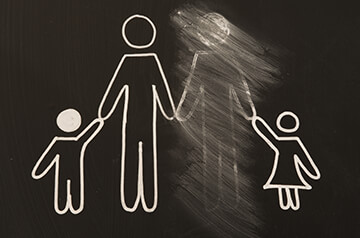Child support
When parents get divorced from one another – they do not divorce their children. The payment of child support is an obligation of the parent to his children. Often, the major disputes in a divorce concern child support. The fixed monthly expense is a hardship for the parents and makes the divorce disputes fierce and bitter. The father feels that he has turned into a credit card, while the mother feels exploited.
A professionally drawn up divorce agreement that has been scrutinised by the Family or Rabbinical Court can prevent this situation.

Decreasing and increasing child support
Sometimes, after a few years, the divorced fathers find themselves unable to meet the payments fixed in the divorce agreement. A claim to decrease the child support payments is possible when the circumstances have changed significantly since signing the child support agreement or since the court order. A claim to decrease the child support payments is possible, and we are experts in this field.
The fixed monthly expense is a hardship for the parents and makes the divorce disputes fierce and bitter. The father feels that he has turned into a credit card, while the mother feels exploited.
ByRaising alimony fees
Sometimes the mother feels that the lost food fees are no longer enough. Feel free to call and consult at any time.
Fixing the sum of the child support payments
The amount of child support is fixed in accordance with a number of different and complex parameters: the income of the parents; the standard of living of the couple while they were still married; education, housing and other living expenses; a normative sum for Israeli society. All these parameters are combined to reach the sum determined for child support.
What is the practical implementation of the “Equality in Child Support Law”?
The “Equality in Child Support Law” broke all the rules that had served the Family Law Court as a basis for fixing the sum for child support (regarding children over the age of six years)! Until then, the father was obliged to pay child support, while the court payed little attention to the relative amounts of time spent with each parent and of the income of each parent. As the times have changed, the new law fixed that there should also be equality between the parents regarding child support.
According to the law, the sum of child support is calculated in relation to the amount of time spent in the custody of each parent, and to the income of each parent. For example, take the parents of an 8-year old child, where the father earns 10,000 NIS/month and the mother earns 5,000 NIS/month, the child is in the custody of the father 40% of the time and the estimated costs for the child are 3,000 NIS.
In this case, since the child is with the father 40% of the time – he is obliged to pay only 60% of the overall child support (1,800 NIS); from this sum, the father pays in accordance with his income relative to the overall income of both parents. That is, he earns 2/3 of the total income of the two parents (10,000 out of a total of 15,000 NIS/month) – and therefore he must pay 2/3 of the child support obligation of 1,800 NIS, which amounts to only 1,200 NIS!

